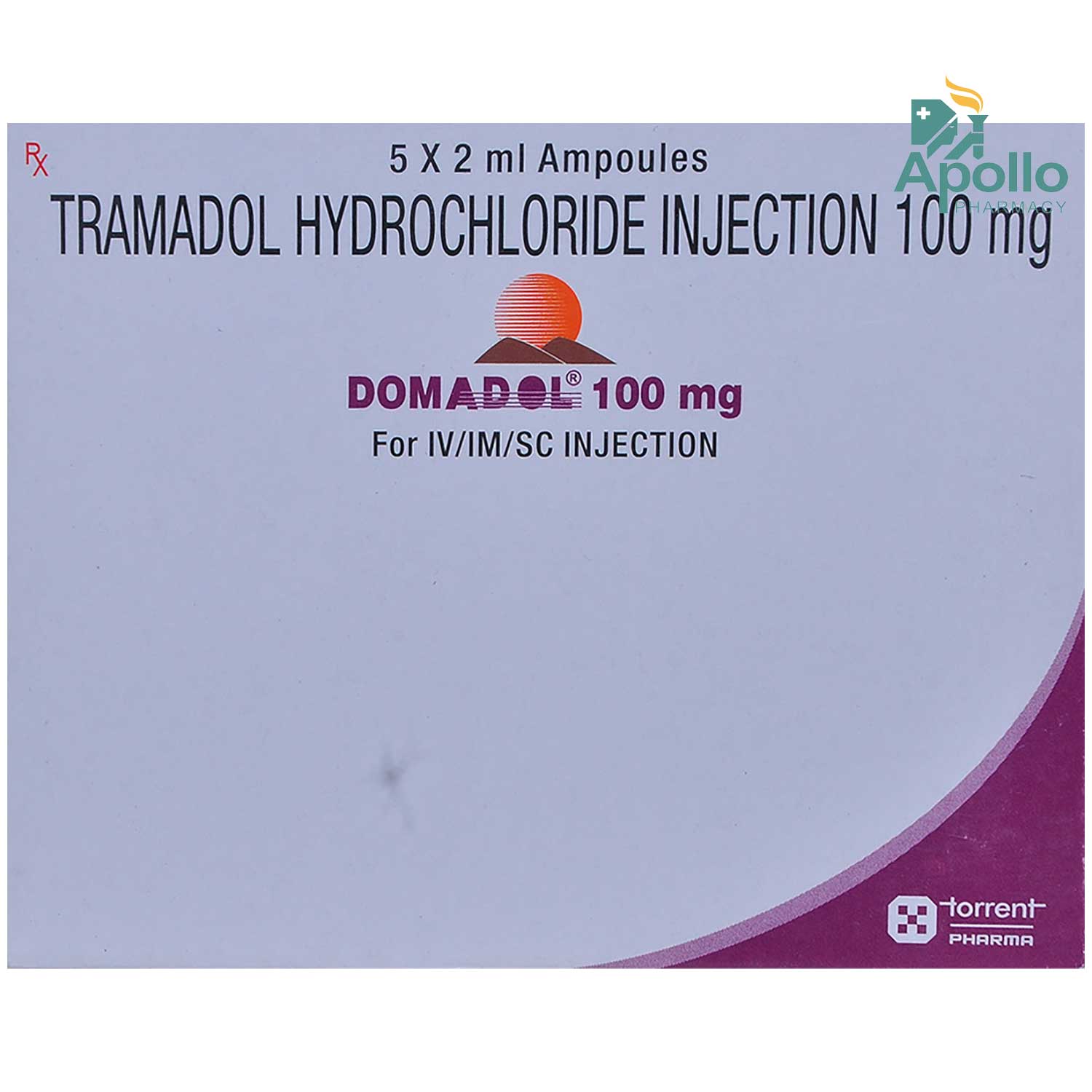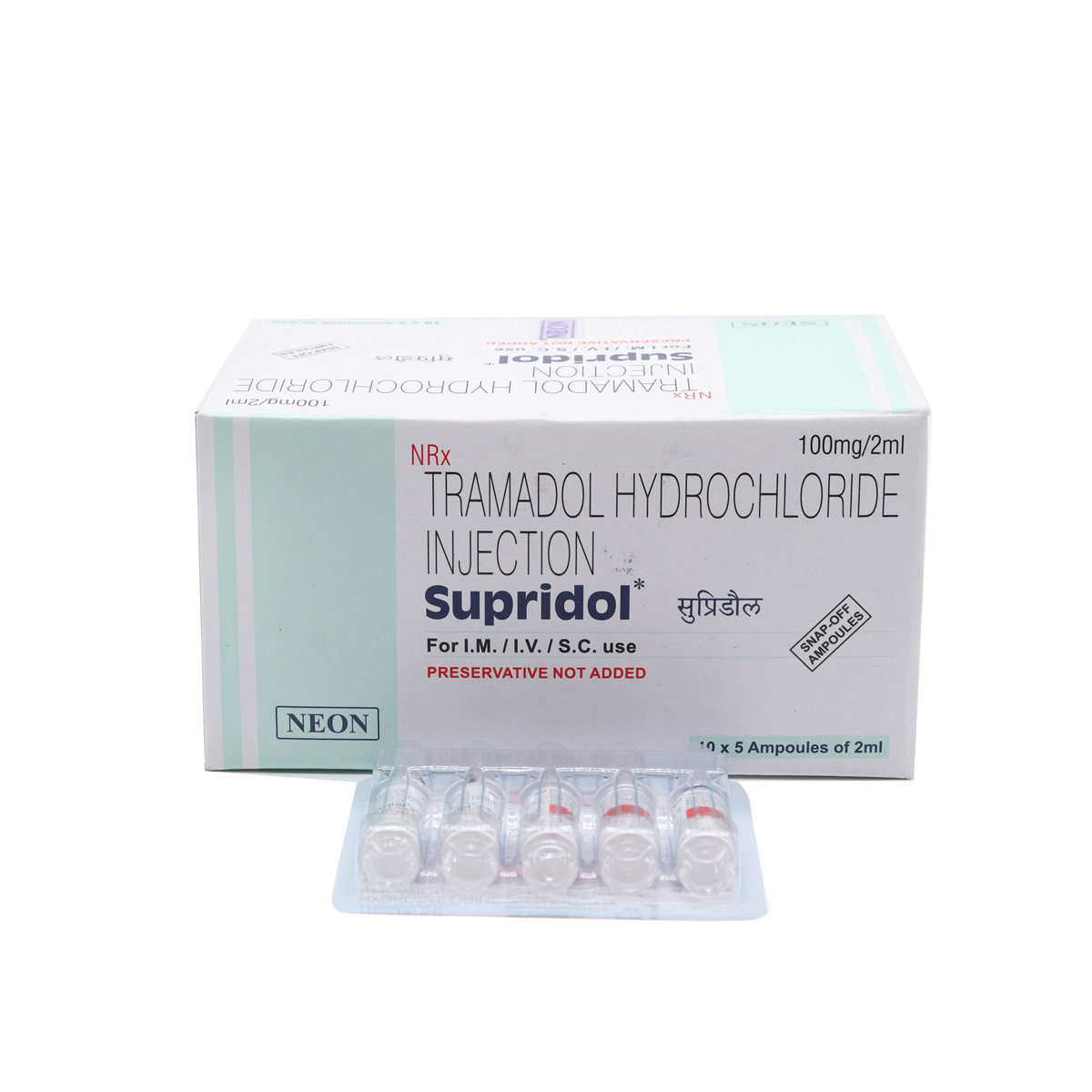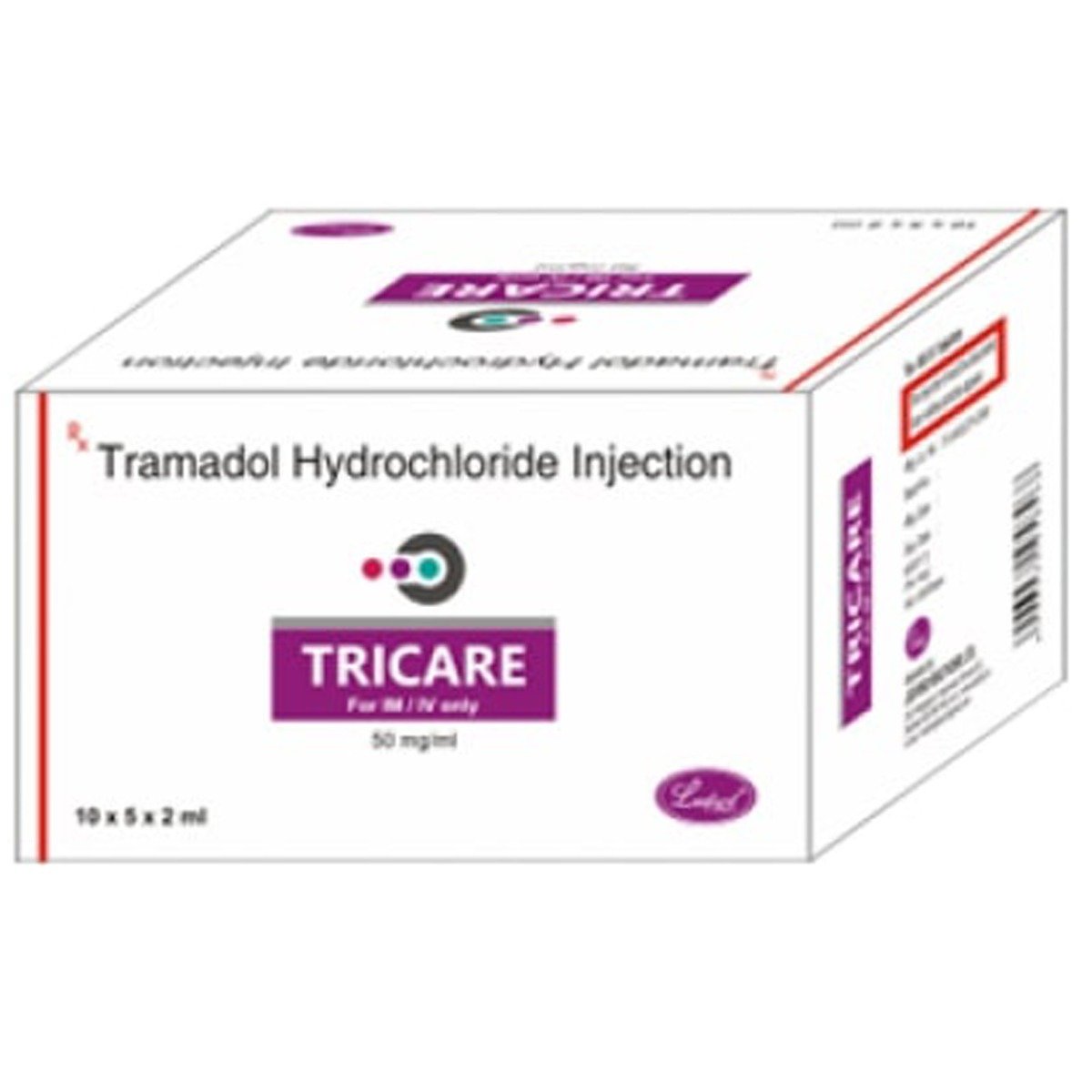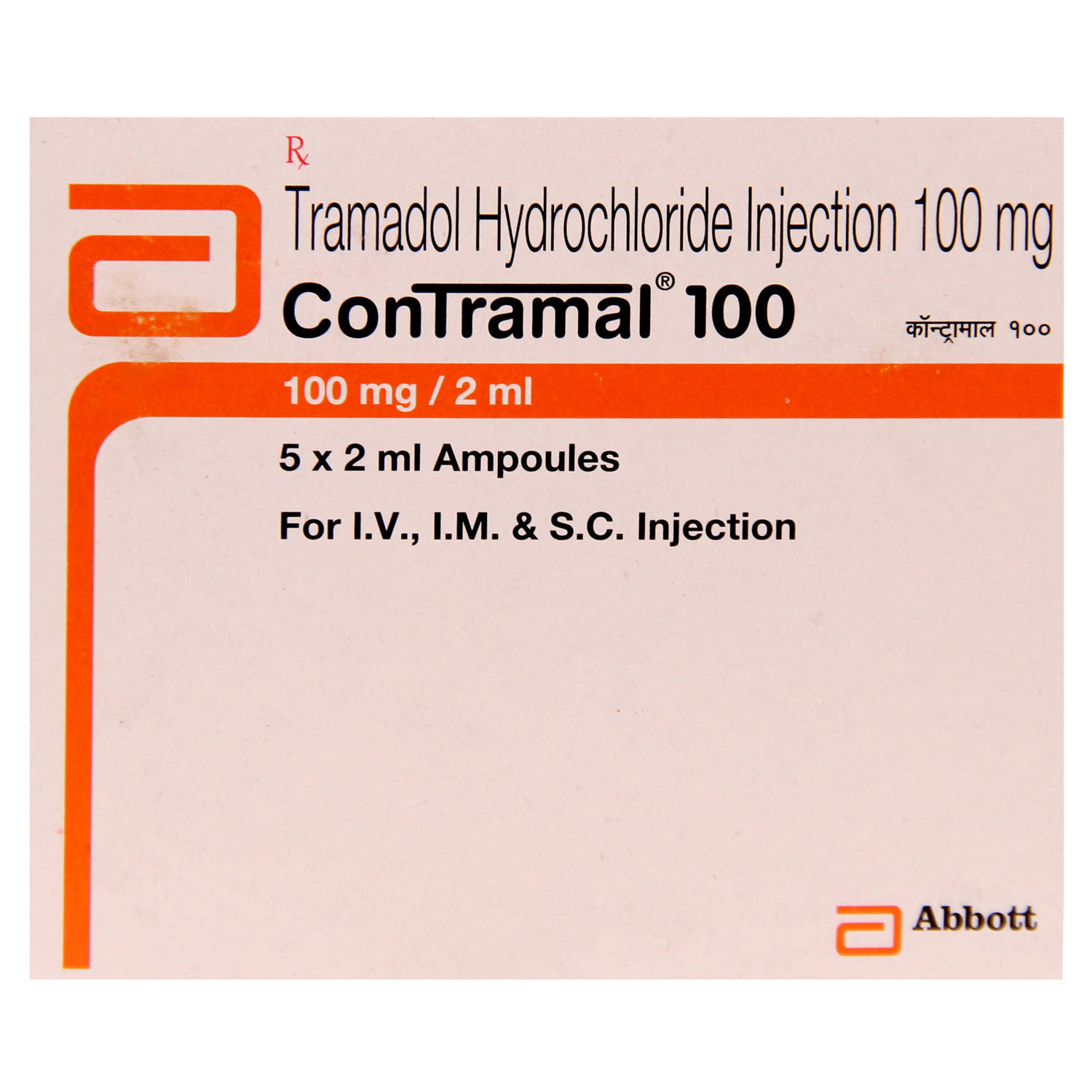Tramadin-100 Injection 2 ml
MRP ₹25
(Inclusive of all Taxes)
₹3.8 Cashback (15%)
Provide Delivery Location
Online payment accepted
 Prescription drug
Prescription drugWhats That
Composition :
Manufacturer/Marketer :
Consume Type :
Expires on or after :
Return Policy :
About Tramadin-100 Injection 2 ml
Tramadin-100 Injection 2 ml belongs to a class of medicines called opioid analgesics (pain killers). Tramadin-100 Injection 2 ml is primarily used in the treatment of moderate to severe pain. Pain is an unpleasant sensation caused by an injury or illness. Pain may be acute (short term) or chronic (long term). It can be general (overall body pains) or localized (pain in a specific area of the body).
Tramadin-100 Injection 2 ml contains Tramadol that works by mimicking the action of endorphins (pain-reducing chemicals) in the brain and spinal cord. Thereby, inhibits the transmission of pain signals from nerves to brain. Also, Tramadin-100 Injection 2 ml improves the effect of serotonin and noradrenaline (chemical messengers in brain and spinal cord) and helps in relieving pain.
Tramadin-100 Injection 2 ml will be administered by a healthcare professional; do not self-administer. In some cases, you may experience nausea, dizziness, headache, vomiting, dry mouth, drowsiness, constipation or sweating. Most of these side effects of Tramadin-100 Injection 2 ml do not require medical attention and gradually resolve over time. However, if the side effects worsen or persist, please consult your doctor.
If you are known to be allergic to Tramadin-100 Injection 2 ml or any other medicines, please tell your doctor. Tramadin-100 Injection 2 ml is not recommended for children suffering from breathing problems. If you are pregnant or breastfeeding or have history of fits, please inform your doctor before taking Tramadin-100 Injection 2 ml. Do not consume alcohol with Tramadin-100 Injection 2 ml as it may increase the risk of side effects. Avoid frequent or high doses as it may lead to addiction.
Uses of Tramadin-100 Injection 2 ml
Directions for Use
Key Benefits
Tramadin-100 Injection 2 ml is a pain killer that works by mimicking the action of endorphins (pain-reducing chemicals) in the brain and spinal cord. Thereby, inhibits the transmission of pain signals from nerves to the brain. Also, Tramadin-100 Injection 2 ml improves the effect of serotonin and noradrenaline (chemical messengers in the brain and spinal cord) and helps in relieving pain. Tramadin-100 Injection 2 ml is used to relieve pain after surgery, pain caused by an injury or illness.
Storage
Drug Warnings
If you are allergic to Tramadol or any other medicines, please tell your doctor. Tramadin-100 Injection 2 ml is not recommended for children suffering from breathing problems as it may worsen the symptoms of tramadol toxicity. If you are pregnant or breastfeeding or have a history of fits, please inform your doctor before taking Tramadin-100 Injection 2 ml. Do not consume alcohol with Tramadin-100 Injection 2 ml as it may increase the risk of side effects. Tramadin-100 Injection 2 ml may cause withdrawal symptoms if stopped abruptly. Avoid frequent or high doses as it may lead to addiction.
Drug-Drug Interactions
Drug-Drug Interactions
Login/Sign Up
Taking rasagiline with Tramadin-100 Injection 2 ml can increase the risk of serotonin syndrome (A condition in which a chemical called serotonin increase in your body).
How to manage the interaction:
Taking Tramadin-100 Injection 2 ml with Rasagiline is not recommended, as it can lead to an interaction, but can be taken if advised by your doctor. However, if you experience any symptoms like severe headache, blurred vision, confusion, seizures, chest pain, nausea or vomiting, sudden numbness or weakness (especially on one side of the body), speech difficulties, fever, sweating, lightheadedness, and fainting, contact your doctor immediately. Do not discontinue any medications without first consulting your doctor.
Combining Tranylcypromine with Tramadin-100 Injection 2 ml can increase the risk of serotonin syndrome (a condition in which a chemical called serotonin increase in your body).
How to manage the interaction:
Taking Tranylcypromine with Tramadin-100 Injection 2 ml is not recommended, but can be taken together if prescribed by a doctor. However, consult a doctor if you experience confusion, hallucination(seeing and hearing things that do not exist), fits, blood pressure alteration, increased heart rate, fever, excessive sweating, shivering or shaking, blurred vision, pain in the muscles or stiffness, incoordination, stomach cramps, nausea, vomiting, and diarrhea. Do not discontinue any medications without consulting your doctor.
Taking Safinamide with Tramadin-100 Injection 2 ml can increase the risk of serotonin syndrome (A condition in which a chemical called serotonin increase in your body).
How to manage the interaction:
Taking Safinamide with Tramadin-100 Injection 2 ml is not recommended as it can possibly result in an interaction, but can be taken together if prescribed by a doctor. However, consult a doctor if you experience confusion, hallucination(seeing and hearing things that do not exist), fits, blood pressure alteration, increased heart rate, fever, excessive sweating, shivering or shaking, blurred vision, pain in the muscles or stiffness, incoordination, stomach cramps, nausea, vomiting, and loose stools. Do not discontinue any medications without consulting your doctor.
Combining Phenelzine with Tramadin-100 Injection 2 ml can increase the risk of serotonin syndrome and seizures.
How to manage the interaction:
Taking Tramadin-100 Injection 2 ml with Phenelzine is not recommended, please consult your doctor before taking it.
Co-administration of Linezolid with Tramadin-100 Injection 2 ml can increase the risk of serotonin syndrome and seizures.
How to manage the interaction:
Taking Linezolid with Tramadin-100 Injection 2 ml is not recommended, consult a doctor before taking it. Consult a doctor if you experience confusion, hallucination, seizure, extreme changes in blood pressure, increased heart rate, fever, excessive sweating, shivering or shaking, blurred vision, muscle spasm or stiffness, tremor, incoordination, stomach cramp, nausea, vomiting, and diarrhea. Do not stop using any medications without talking to a doctor.
Co-administration of Tramadin-100 Injection 2 ml with Alvimopan can make the side effects worse or more dangerous.
How to manage the interaction:
Taking Alvimopan with Tramadin-100 Injection 2 ml is not recommended, please consult your doctor before taking it.
Co-administration of Ziprasidone with Tramadin-100 Injection 2 ml can increase the risk of irregular heart rhythm.
How to manage the interaction:
Taking Tramadin-100 Injection 2 ml with Ziprasidone together can possibly result in an interaction, but it can be taken if a doctor has advised it. However, consult a doctor immediately if you experience sudden dizziness, lightheadedness, fainting, shortness of breath, or heart palpitations. Do not discontinue any medications without consulting a doctor.
Co-administration of metoclopramide with Tramadin-100 Injection 2 ml may increase the risk of seizures(fits).
How to manage the interaction:
Although there is a possible interaction between metoclopramide and Tramadin-100 Injection 2 ml, you can take these medicines together if prescribed by your doctor. Do not stop using medications without a doctor's advice.
Co-administration of oxazepam with Tramadin-100 Injection 2 ml can increase the risk of irregular heart rhythms.
How to manage the interaction:
Taking oxazepam with Tramadin-100 Injection 2 ml together is generally avoided as it can possibly result in an interaction, but it can be taken if your doctor has advised it. However, contact a doctor immediately if you experience dizziness, lightheadedness, fainting, shortness of breath, or irregular heartbeat. Do not discontinue any medications without consulting a doctor.
Co-administration of Tramadin-100 Injection 2 ml with mifepristone can increase the risk of irregular heart rhythms.
How to manage the interaction:
Taking Tramadin-100 Injection 2 ml with mifepristone together can result in an interaction, it can be taken if a doctor has advised it. However, contact a doctor immediately if you experience any symptoms such as dizziness, lightheadedness, fainting, shortness of breath, or irregular heartbeat. Do not discontinue any medications without consulting a doctor.
Drug-Food Interactions
Drug-Food Interactions
Login/Sign Up
Diet & Lifestyle Advise
- Do regular exercises such as swimming or walking.
- Drink plenty of water while taking Tramadin-100 Injection 2 ml to avoid dry mouth.
- Maintain a fibre-rich diet and eat plenty of fresh fruits and vegetables to avoid constipation while taking Tramadin-100 Injection 2 ml.
- Avoid consumption of alcohol and quit smoking.
Side Effects of Tramadin-100 Injection 2 ml
- Nausea
- Dizziness
- Headache
- Vomiting
- Dry mouth
- Drowsiness
- Constipation
- Sweating
Habit Forming
Therapeutic Class
All Substitutes & Brand Comparisons
RX
Not for online saleDomadol 100 mg Injection 2 ml
₹24.5
(₹11.05/ 1ml)
1% CHEAPERRX
Out of StockNot for online saleTramascan 100 mg Injection 2 ml
Medishri Healthcare Pvt Ltd
₹24.5
(₹11.05/ 1ml)
1% CHEAPER
Author Details
We provide you with authentic, trustworthy and relevant information
Drug-Diseases Interactions
Drug-Diseases Interactions
Login/Sign Up
FAQs
Drug-Drug Interactions Checker List
- CARBAMAZEPINE
- ONDANSETRON
- FLUOXETINE
- DOXEPIN
- DROPERIDOL
- MORPHINE
- CODEINE
- WARFARIN
Special Advise
- Patients with severe liver or kidney insufficiency should avoid taking Tramadin-100 Injection 2 ml.
Disease/Condition Glossary
Pain: It is an unpleasant sensation caused by an injury or illness. Pain may be acute (short term) or chronic (long term). It can be general (overall body pains) or localized (pain in a specific area of the body). Pain is highly subjective as some people have a high tolerance for pain while others have a low tolerance. Pain may be caused due to cramps, headache, bone fractures, stomach pain, arthritis (swelling of one or more joints), muscle strain, cuts, flu, irritable bowel syndrome (intestinal disorder causing stomach pain, diarrhoea or constipation), fibromyalgia (muscle pain with stiffness and tenderness), certain disease conditions, or medical procedures.

Have a query?
Alcohol
Safe if prescribed
Avoid consumption of alcohol with Tramadin-100 Injection 2 ml as it may cause drowsiness or increase the risk of side effects.
Pregnancy
Consult your doctor
Tramadin-100 Injection 2 ml is usually not recommended during pregnancy as chronic use of Tramadin-100 Injection 2 ml during pregnancy may lead to withdrawal symptoms in newborns. However, please inform your doctor if you are pregnant before taking Tramadin-100 Injection 2 ml.
Breast Feeding
Consult your doctor
Tramadin-100 Injection 2 ml may be excreted into breastmilk. Please consult your doctor. Your doctor will decide if Tramadin-100 Injection 2 ml can be given to breastfeeding mothers or not.
Driving
Safe if prescribed
Tramadin-100 Injection 2 ml may cause dizziness, blurred vision or drowsiness in some people. Therefore, avoid driving if you feel drowsy, dizzy or experience any vision problems after taking Tramadin-100 Injection 2 ml.
Liver
Consult your doctor
Take Tramadin-100 Injection 2 ml with caution, especially if you have a history of Liver diseases/conditions. The dose may be adjusted by your doctor as required.
Kidney
Consult your doctor
Take Tramadin-100 Injection 2 ml with caution, especially if you have a history of Kidney diseases/conditions. The dose may be adjusted by your doctor as required.
Children
Safe if prescribed
Tramadin-100 Injection 2 ml should be used in doses recommended by a doctor for children above 1 year. It is not recommended for children with breathing problems as it may worsen tramadol toxicity symptoms.












_0.jpg?tr=q-85)
